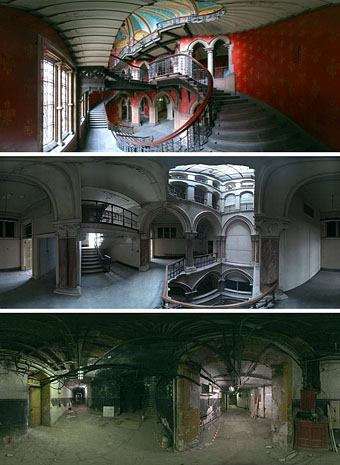Lesbian Witches Claim Credit For Falwell Demise
Goddess bless them.
Two guys kissing

I can’t resist the opportunity to acknowledge the demise today of one of America’s worst bigots with a picture of something he’d really, really hate. All your efforts were in vain, fat boy—tough.
Photography by the wonderful Jack Slomovits.
Update: Boing Boing posts the parody ad from Hustler that had Falwell claiming to have lost his virginity to his mother in an outhouse. Falwell sued Hustler editor Larry Flynt over that—and lost—in a long freedom of speech trial that went all the way to the Supreme Court.
Previously on { feuilleton }
• Gay for God
Oh Yeah by Charles Mingus
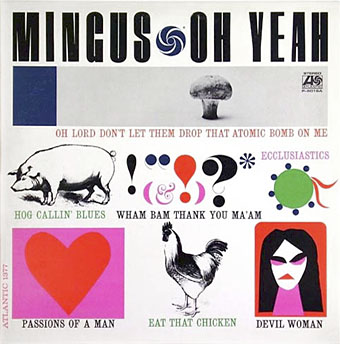
Oh Yeah (1962). Sleeve design by Loring Eutemey.
“People say that I’m hollering. Man, I feel like hollering.” Charles Mingus.
Listening to this great album this week had me searching for the equally great sleeve design from the vinyl edition which vanished from the CD reissue. The cover that replaced it is a dour photo of a gloomy-looking Mingus, completely unsuited to an album full of joyous noise. Happily there’s a Japanese edition that preserves the original design. As far as I can gather Loring Eutemey was a house designer at Atlantic, responsible for many of their jazz sleeves but also providing covers for rock albums including Iron Butterfly’s dumb psychedelic opus, In-A-Gadda-Da-Vida. Lots of playful typography evident in Eutemey’s designs and bold, hand-drawn graphics à la Saul Bass, a style very popular in the Sixties not least because of Bass’s considerable influence.
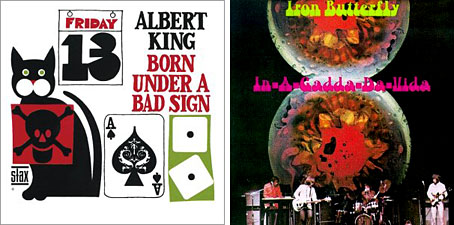
Designs by Loring Eutemey: Born Under A Bad Sign (1967), In-A-Gadda-Da-Vida (1968).
That playfulness especially suits an album where Mingus set aside his bass to play piano and sing (or, more correctly, holler) his way through seven tracks of energetic craziness. There are some amazing solos here from Rahsaan Roland Kirk, a blind musician famous for playing two saxophones at once, one in each hand. The opening Hog Callin’ Blues is one of my favourite jazz pieces, a number where bop rawness approaches the equivalent rawness of Fifties’ rock’n’roll or Chess blues. Always great to play (loud!) to people who think jazz is all polite cocktail music and studied cool. Mingus recorded lots of great albums, of course, and I imagine this is regarded as a throwaway novelty by many of his more dedicated listeners, but it remains one I keep returning to.
Charles Mingus—piano and vocals
Rahsaan Roland Kirk—flute, siren, tenor sax, manzello, and strich
Booker Ervin—tenor sax
Jimmy Knepper—trombone
Doug Watkins—bass
Dannie Richmond—drums
1 Hog Callin’ Blues (7:26)
2 Devil Woman (9:38)
3 Wham Bam Thank You Ma’am (4:41)
4 Ecclusiastics (6:55)
5 Oh Lord Don’t Let Them Drop That Atomic Bomb On Me (5:38)
6 Eat That Chicken (4:36)
7 Passions Of A Man (4:52)
Elsewhere on { feuilleton }
• The album covers archive
St Pancras in Spheroview
The deteriorated Gothic splendour of George Gilbert Scott’s railway hotel at St Pancras station, London, in a series of 360 degree views. The empty building looks distinctly creepy in many of these panoramas, like unused maps for a computer game.
Elsewhere on { feuilleton }
• The panoramas archive
Previously on { feuilleton }
• Adolph Sutro’s Gingerbread Palace
Machinefabriek in Manchester
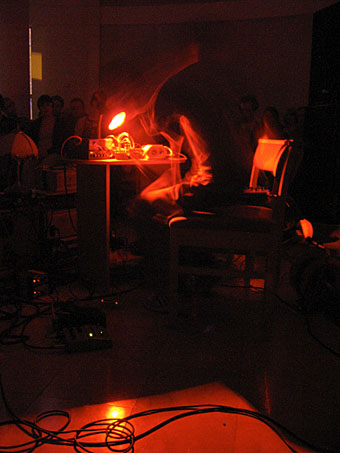
The Bacon-esque blur is Machinefabriek, aka Rutger Zuydervelt from the Netherlands, performing this evening at the Cross Street Chapel with Xela and friends. Events I’ve seen here before have been predominantly acoustic so it made a change to see something where the balance was shifted in favour of electronics or the electronic processing of acoustic sources. The chapel is a good, intimate venue, with seating in the round.
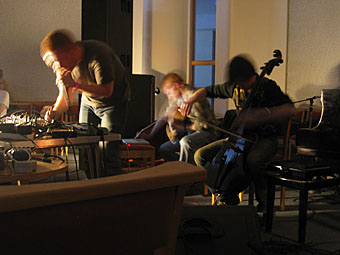
Xela (above) played first, comprising John Twells (Mr Type Records, left) with an amended line-up featuring Danny Saul on guitar and laptop with Greg Haines on cello and the chapel’s own piano which he proceeded to treat in a distinctly secular fashion. These three set the tone for the evening, starting quietly and harmoniously then working into an accumulated frenzy of noise. Type Records are one of the best labels around at the moment, all their releases (and, it should be said, those of these artists) are worth checking out.
There was a break from the noise with Soccer Committee, who aren’t a group of Eindhoven footballer managers but a young woman named Mariska Baars. Mariska plays very quiet (and very good) songs on guitar and it’s a shame that most of her pieces were so short. I didn’t get any photos as she was playing in near dark and rapt silence from the audience.
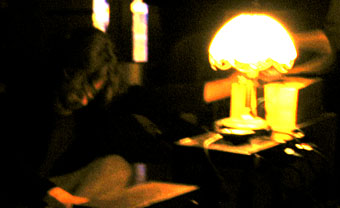
Next up was Wouter Van Veldhoven (above) playing a Stratocaster guitar through a variety of what looked like synth modules topped by an antique table lamp. One can’t help but speculate whether any German musicians (including my sainted Robert Henke) would dare to have such an anacronistic item near their gear.
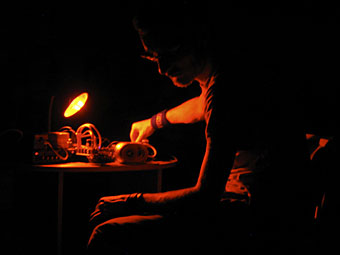
And so to Machinefabriek, an artist who releases a bewildering amount of limited edition CD-Rs, mostly on his own label. Mr Zuydervelt sat before his tiny table and proceeded to produce a quite incredible array of sounds from an electric guitar and what looked like effects pedals and electric egg-timers (and a pan-scourer…?). As with Xela, the sounds proceeded from melodic ambience to noise, in this instance great sheets of harmonic distortion which—like all the best noise performances—became deliriously overwhelming. Brilliant, compelling stuff, and it’s a shame he didn’t play for longer. After this, Wouter and Mariska returned and the three quickly launched into an improvised coda. A great evening.
Previously on { feuilleton }
• Helios in Manchester
• Music on Cross Street

